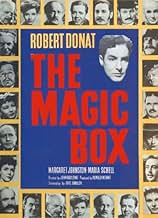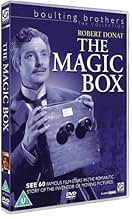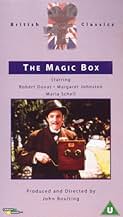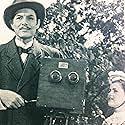VALUTAZIONE IMDb
7,0/10
1506
LA TUA VALUTAZIONE
Aggiungi una trama nella tua linguaA chronicle of the life of William Friese-Greene, a British inventor and early pioneer in cinema.A chronicle of the life of William Friese-Greene, a British inventor and early pioneer in cinema.A chronicle of the life of William Friese-Greene, a British inventor and early pioneer in cinema.
- Nominato ai 2 BAFTA Award
- 1 vittoria e 2 candidature totali
Renée Asherson
- Miss Tagg
- (as Renee Asherson)
Recensioni in evidenza
A brilliant biography of one of the virtually unknown inventors of modern motion pictures. The historical aspects are incredibly well researched and detailed (look at the film credits)-- down to the reproduction of a beautiful example of his first twin-lensed motion picture camera, which was stereoscopic (which proved not be be practical until the introduction of polarized projection at the 1939 World's Fair). This film was made as a showcase piece for the 1951 "Festival of Britain" at the current location of the Royal Festival Hall and the Museum of the Moving Image on the banks of the Thames in London, England. What remains of the original Friese-Greene camera may be seen at the Science Museum in London. For those interested in the history of the cinema, and its earliest experiments, this is a "must see" film. Historical footage is brilliantly incorporated into the story. Although the presentation is a little bit slow by today's standards, it remains a fascinating and unique film. For related topics see the book "The Missing Reel", by Christopher Rawlence, about the other unknown film pioneer, Louis Aime Augustin Le Prince.
Much has been said in other reviews about the subject of John Boulting's biopic, the inventor William Friese-Greene, who spent his life trying to create the eponymous "magic box" that would show moving pictures. Whether he was the first to do so is largely insignificant: the fact that he went largely unrecognized assumes far greater importance.
Planned to celebrate the Festival of Britain in 1951, THE MAGIC BOX recognizes the achievements of someone who spent just about everything - time, money and effort - on his work. Director Boulting alternates between scenes in Friese Greene's (Robert Donat's) laboratory, with domestic sequences involving his wives Edith (Margaret Johnston) and Helena (Maria Schell). Although a devoted husband, Friese-Greene is so obsessed with his work that he neglects his family; as shown in several sequences where he begins to talk excitedly about his discoveries, while remaining oblivious to his wives' complaints. In one sequence, for example, Edith has to remind him that he has missed an important concert at which he was supposed to be the soloist; to avoid any embarrassment with the conductor (Muir Matheson), she had to fill in for him. Sometimes his wives sacrifice their own health to support him; Helena is shown in close-up crumpling a medicinal prescription in her hand as she travels home by coach. In her view it's far more important to encourage Friese-Greene's work than to cure her congenital heart condition.
Boulting adopts an equivocal view of Friese-Greene's work; although obviously an innovator, his obsessions caused pain and suffering in his family, and led to the break-up of profitable partnerships such as that with rich northern business person Arthur Collings (Eric Portman), which could have secured Friese-Greene's financial future.
The film is structured in double flashback, showing us how Friese- Greene's life, and enabling Donat to give a virtuoso performance in the title role. This most underrated of British actors was particularly good at portraying tortured souls (remember GOODBYE MR. CHIPS (1939)), and he manages to communicate the pain lurking at the heart of Friese-Greene's soul, once he realizes the damage he has done to his family. Boulting is fond of using the quick close-up to register his emotions.
As well as being a celebration of the inventor, THE MAGIC BOX celebrates the British film industry by offering roles to virtually all the major stars (and supporting actors) working in the studios at that time. The film offers fans the pleasure of identifying people in the smallest roles, and enjoying scene-stealing cameos such as Margaret Ruthferford's irascible dowager telling Friese- Greene's first employer Guttenberg (Frederick Valk) off; Joyce Grenfell at her toothiest as a member of Edith's choral society; Sidney James and William Hartnell as a pair of World War One army personnel; and Laurence Olivier in his famous cameo as a London police officer marveling at Friese-Greene's invention.
Thematically speaking, Eric Ambler's script might be a familiar one, but that does not prevent viewers from enjoying the film as a celebration of a long-forgotten figure as well as British films as a whole.
Planned to celebrate the Festival of Britain in 1951, THE MAGIC BOX recognizes the achievements of someone who spent just about everything - time, money and effort - on his work. Director Boulting alternates between scenes in Friese Greene's (Robert Donat's) laboratory, with domestic sequences involving his wives Edith (Margaret Johnston) and Helena (Maria Schell). Although a devoted husband, Friese-Greene is so obsessed with his work that he neglects his family; as shown in several sequences where he begins to talk excitedly about his discoveries, while remaining oblivious to his wives' complaints. In one sequence, for example, Edith has to remind him that he has missed an important concert at which he was supposed to be the soloist; to avoid any embarrassment with the conductor (Muir Matheson), she had to fill in for him. Sometimes his wives sacrifice their own health to support him; Helena is shown in close-up crumpling a medicinal prescription in her hand as she travels home by coach. In her view it's far more important to encourage Friese-Greene's work than to cure her congenital heart condition.
Boulting adopts an equivocal view of Friese-Greene's work; although obviously an innovator, his obsessions caused pain and suffering in his family, and led to the break-up of profitable partnerships such as that with rich northern business person Arthur Collings (Eric Portman), which could have secured Friese-Greene's financial future.
The film is structured in double flashback, showing us how Friese- Greene's life, and enabling Donat to give a virtuoso performance in the title role. This most underrated of British actors was particularly good at portraying tortured souls (remember GOODBYE MR. CHIPS (1939)), and he manages to communicate the pain lurking at the heart of Friese-Greene's soul, once he realizes the damage he has done to his family. Boulting is fond of using the quick close-up to register his emotions.
As well as being a celebration of the inventor, THE MAGIC BOX celebrates the British film industry by offering roles to virtually all the major stars (and supporting actors) working in the studios at that time. The film offers fans the pleasure of identifying people in the smallest roles, and enjoying scene-stealing cameos such as Margaret Ruthferford's irascible dowager telling Friese- Greene's first employer Guttenberg (Frederick Valk) off; Joyce Grenfell at her toothiest as a member of Edith's choral society; Sidney James and William Hartnell as a pair of World War One army personnel; and Laurence Olivier in his famous cameo as a London police officer marveling at Friese-Greene's invention.
Thematically speaking, Eric Ambler's script might be a familiar one, but that does not prevent viewers from enjoying the film as a celebration of a long-forgotten figure as well as British films as a whole.
I'm sure it didn't hurt in the resolve of the British film industry to honor one of its pioneers and one who some claim to have been the actual inventor of motion pictures, William Friese-Greene, to have one of his grandchildren, Richard Greene as a film star in his own right. The Magic Box is a fine tribute to someone generally forgotten if known at all to American audiences especially.
Robert Donat brings his Mr. Chips character and weaves it into the character of William Friese-Greene. The story is told in flashback and in reverse order, first by his second wife Margaret Johnston from their first meeting in 1897 through their marriages and then later by Donat himself as he remembers his first wife Maria Schell. But in both remembrances, the thing that stands out is his driving obsession to capture movement on some medium. As Donat eloquently puts it, 'movement is life'.
It costs him dear, he does not get the credit he feels due him, it goes to that upstart Thomas Edison from the USA. Actually fellow Britishers George Alfred Smith and Charles Urban and Frenchmen Auguste and Louis Lumiere and Emile Reynaud all could claim pioneering contributions to the motion picture as well. Friese-Greene was a fine portrait photographer, but spent all his money on his experiments, even selling the patent he took out on his early motion picture camera.
Donat, Johnston and Schell are supported by a massive cast of the best British players doing small parts in tribute and belated recognition to the guy who now is considered if not THE inventor of motion pictures, the founder of British cinema. From Laurence Olivier in the role of an astonished policeman who is the first to see Robert Donat's breakthrough, to Bernard Miles as Donat's stuffy cousin who's worried about having the bite put on him, to young John Howard Davies as the youngest of Friese-Greene's sons, you'll recognize lots of familiar faces.
Still the film belongs to Donat as the obsessed, but touching Friese- Greene who helped give the world a universal medium of entertainment. Donat never gave a bad performance on the screen and Friese-Greene ranks among his best.
Robert Donat brings his Mr. Chips character and weaves it into the character of William Friese-Greene. The story is told in flashback and in reverse order, first by his second wife Margaret Johnston from their first meeting in 1897 through their marriages and then later by Donat himself as he remembers his first wife Maria Schell. But in both remembrances, the thing that stands out is his driving obsession to capture movement on some medium. As Donat eloquently puts it, 'movement is life'.
It costs him dear, he does not get the credit he feels due him, it goes to that upstart Thomas Edison from the USA. Actually fellow Britishers George Alfred Smith and Charles Urban and Frenchmen Auguste and Louis Lumiere and Emile Reynaud all could claim pioneering contributions to the motion picture as well. Friese-Greene was a fine portrait photographer, but spent all his money on his experiments, even selling the patent he took out on his early motion picture camera.
Donat, Johnston and Schell are supported by a massive cast of the best British players doing small parts in tribute and belated recognition to the guy who now is considered if not THE inventor of motion pictures, the founder of British cinema. From Laurence Olivier in the role of an astonished policeman who is the first to see Robert Donat's breakthrough, to Bernard Miles as Donat's stuffy cousin who's worried about having the bite put on him, to young John Howard Davies as the youngest of Friese-Greene's sons, you'll recognize lots of familiar faces.
Still the film belongs to Donat as the obsessed, but touching Friese- Greene who helped give the world a universal medium of entertainment. Donat never gave a bad performance on the screen and Friese-Greene ranks among his best.
The most enjoyable and very emotional scene was when Robert Donat (Wm. Friese-Greene) finally succeeds in producing moving images on a sheet he's hung in his studio...he runs like a madman into the street in the middle of the night desperate to find someone to witness this miracle. Who does he find? Sir Laurence Olivier..a Police Constable . Donat ushers him into his lab, sits him down and proceeds to ramble on about what he's invented. Sir Laurence, the ever vigilant and cautious policeman thinks he's some kind of nut and slowly reaches for his night stick..that's when Robert Donat flicks on the first moving pictures of Hyde Park...Olivier is flabergasted..gets up moves to the sheet and looks behind it.."That's Hyde Park!' After rambling some more Robert Donat breaks into tears..finally explaining what he has accomplished..Olivier replies "You must be a very happy man"..a terrific scene and one I'll never forget. A cameo appearance by Lord Olivier and a very memorable scene.
A stunning biography of William Friese-Greene, the UK inventor who made important contributions towards the creation of the motion picture, then saw greatness pass him by. Brilliantly written by Eric Ambler, and with beautiful color photog by Jack Cardiff (working in the 3-strip Technicolor process that we see Friese-Greene working towards in the picture!). Robert Donat's performance in the lead is among his best screen work. As this was made on the occasion of Britain's 1951 "Festival of Lights", virtually every British actor of note at the time appears in the picture---but pay particularl attention for Laurence Olivier, as a London "bobby" who is the first to see Friese-Greene's "pictures that move", and for the film's closing line, delivered by Dennis Price.
Lo sapevi?
- QuizOne of the extras in this movie is a teenage Ronald Kray (later the infamous London gangster).
- BlooperIn 1915 when Green's three eldest sons join the army, the landlord's agent mentions that the Spanish influenza is going around. In actuality the Spanish influenza did not begin until 1918.
- Citazioni
William Fox-Talbot: The original thinker - the innovator - mustn't mind seeming a little foolish to his contemporaries. He must always look to his star... In the end, he may still fail. That's unimportant. If he is true to himself, he won't be too unhappy or embittered, even in failure, and will still speak for what is good.
- Curiosità sui creditiOpening credits superimposed over tablets bearing the following inscriptions: THOMAS ALVA EDISON 1847 - 1931 THE INVENTOR OF MOTION PICTURES / ETIENNE-JULES MAREY 1830 - 1908 FONDATEUR DU CINEMA / LOUIS LE PRINCE 1842 - 1890 L'INVENTEUR DE LA CINEMATOGRAPHIE LOUIS LUMIERE 1864 - 1948 AVEC SON FRERE LE CREATEUR DU CINEMA MODERNE
- ConnessioniEdited into Kraft Television Theatre: The Magic Box (1956)
I più visti
Accedi per valutare e creare un elenco di titoli salvati per ottenere consigli personalizzati
- How long is The Magic Box?Powered by Alexa
Dettagli
Botteghino
- Budget
- 220.000 £ (previsto)
- Tempo di esecuzione
- 1h 58min(118 min)
- Proporzioni
- 1.37 : 1
Contribuisci a questa pagina
Suggerisci una modifica o aggiungi i contenuti mancanti


































